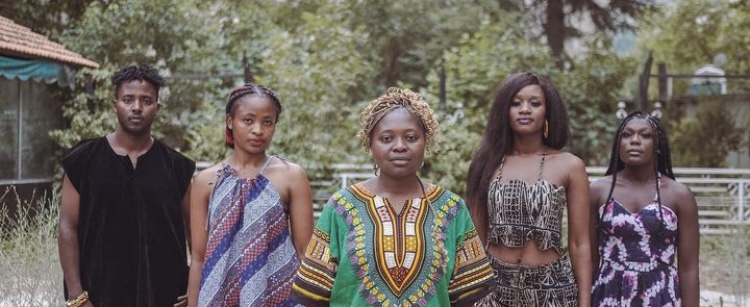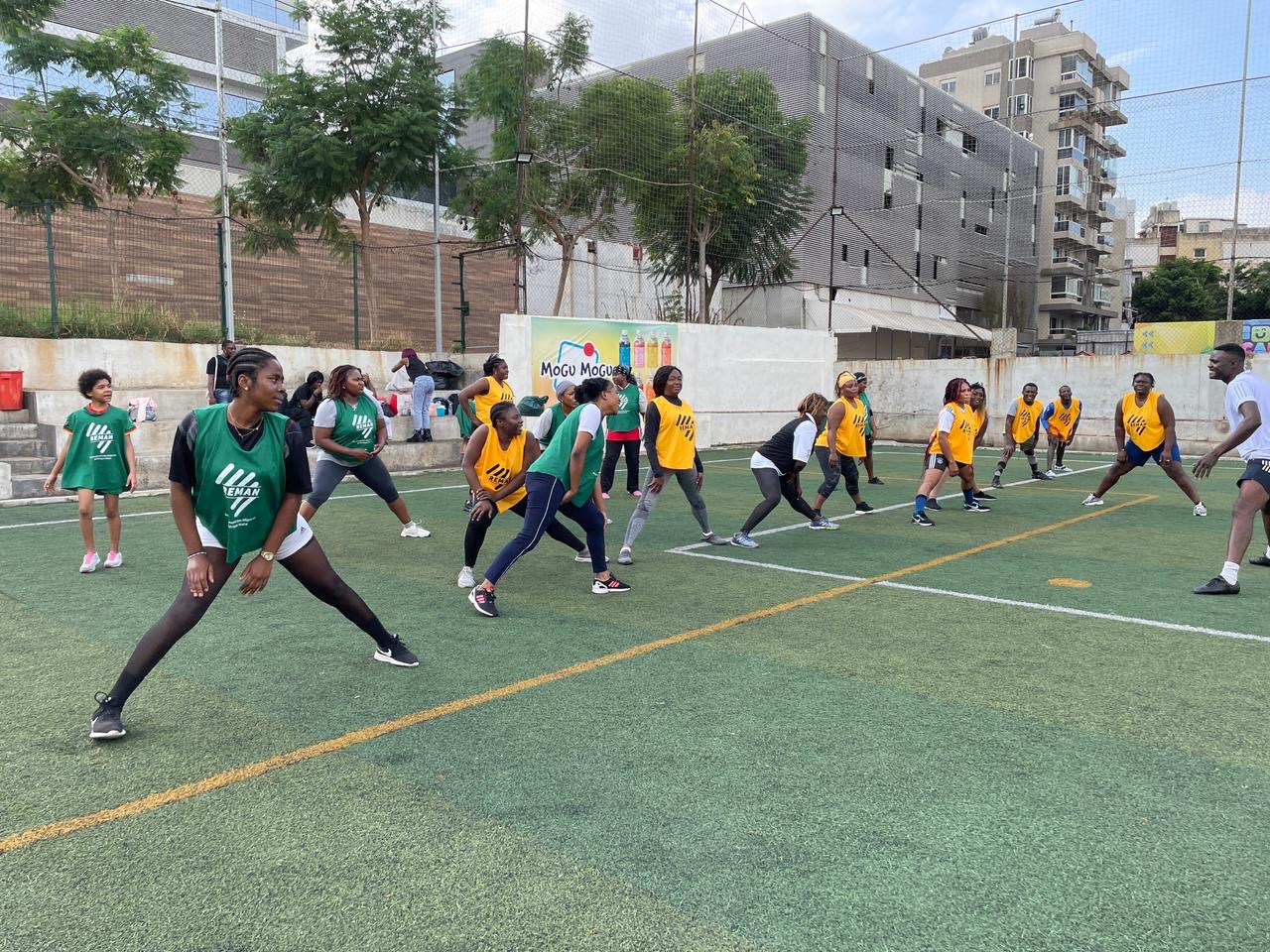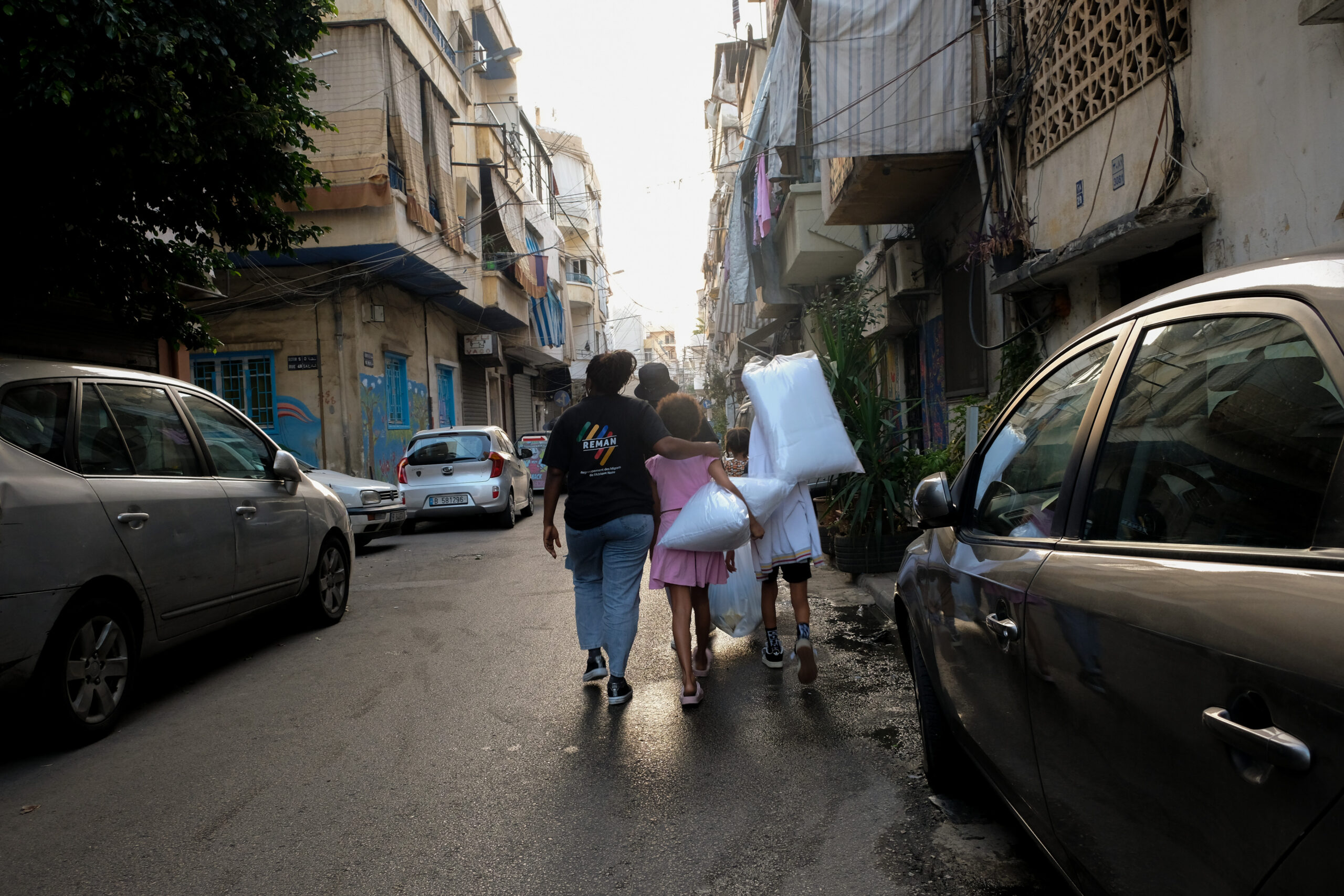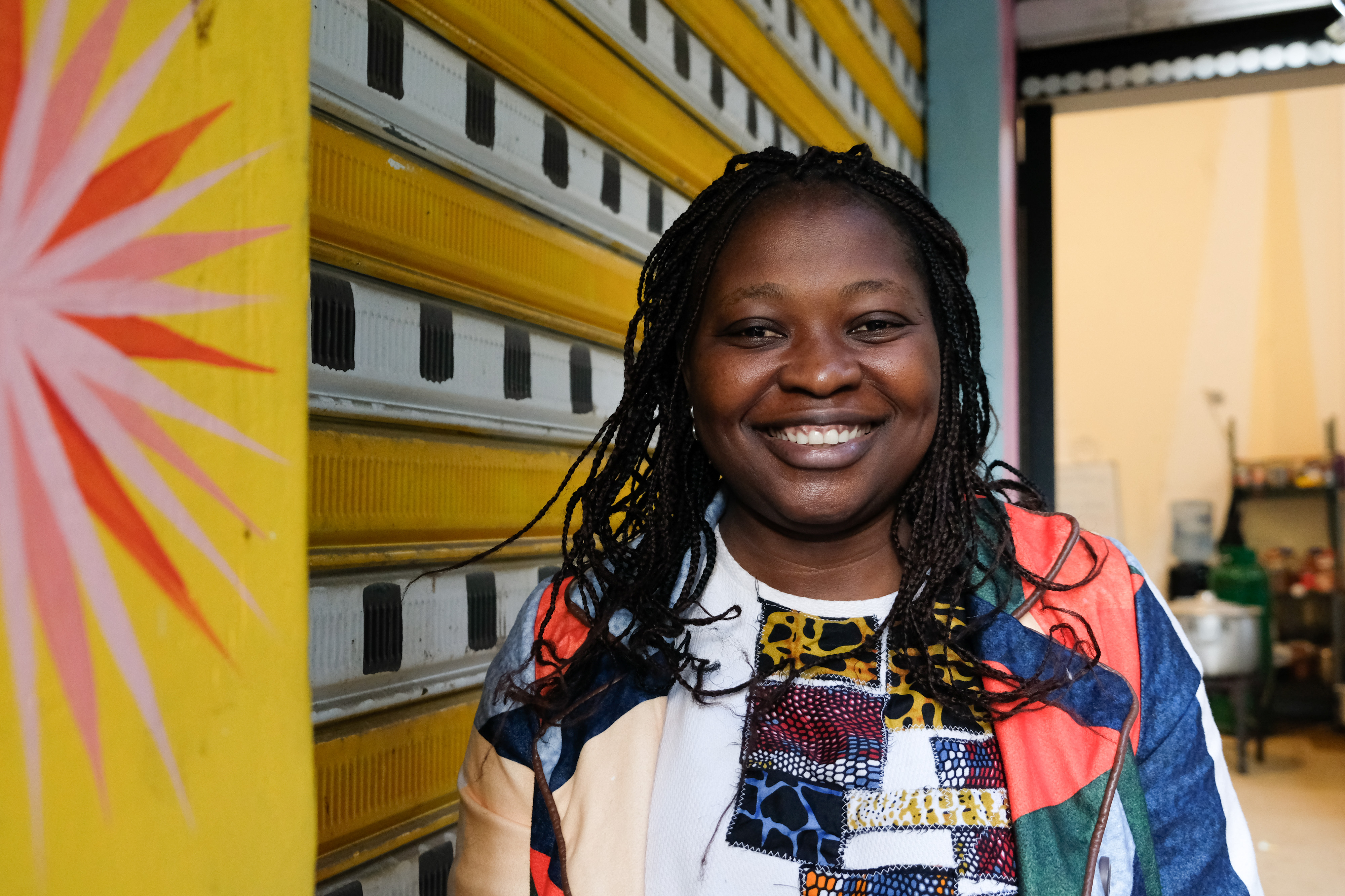As Lebanon’s crisis intensifies, migrant workers under the Kafala system face escalating hardship. Viany De Marceau, drawing on her own experiences, founded REMAN (Regroupement des Migrant.e.s de l’Afrique Noire) to unite migrant workers in the fight for justice.
Written by Viany de Marceau
Translated and edited by Anamê Gnanguenon
Image by Jenny Gustafsson
She had promised me it would be just for 6 months and that afterwards, I could go to Paris to continue my studies. That phrase echoed in my mind while I was in Cameroon before my journey. I will never forget her face, her physique, the inside of her house, the voices of the people she spoke with, and the stairs in her living room that formed a hole, like a small theatre. Her house was a church. And her husband was a man of God. Before arriving at her place, in my mind, it was always: “No! I want to continue my studies. I won’t leave Cameroon!”
Once seated in her living room, she managed to convince me. She took photos of me. Before my arrival, she had insisted that I dress simply, very simply. Only later did I understand the purpose of those photos she took that day. She told me, “Since your passion is sewing, you can continue your studies in Lebanon or France if you want. But once the six months are over, you will have to pay for your studies with your salary.”
After I visited her, signing the employment contract was just a list of embellished obligations that she took care to detail for me.
“You will work in Lebanon from 8 AM to 12 PM. There isn’t much work there. Look over there; that’s my house. I built it myself. After three years in Lebanon, I preferred to return to Cameroon; I didn’t want to travel to another country. I will place you with a good family and ask the recruitment agency to take good care of you. I even have a friend who is still there, but she is studying. I will put you in touch. Also, you can earn more money if you decide to look for work in the neighbourhood after 12 PM or even do some ironing…”
I was no longer thinking about anything, not at all. I just wanted to leave. I envisioned myself in my classroom… a great fashion designer, putting on grand haute couture shows, having a clothing line, being independent and able to pay for my studies. I was 22 years old, and for me, nothing could stop me.
Arriving at the airport in Cameroon, I had a hard time saying goodbye to my brother. For the first time in my life, I felt alone. I had no idea that this would last a long time, a very long time.
After a 10-hour journey, I was at the airport in Beirut, where they confiscated my passport and made us wait for hours on the floor, watching the white people pass by as their lines thinned each time a plane landed.

Most of us slept in the famous little room for housekeepers at the Beirut airport, sitting on our suitcases and bags. Our eyes were fixed on the small lever with a glass window that allowed us to see the employers’ arrival.
I still remember the image of my madame’s car parked at her house. As soon as her mother-in-law asked from her balcony in French, “Is she tall?” The scene was set.
I kept repeating to myself, “Six months, then all of this will be behind you, Viany.” I had bet everything on this trip. I took everything with me, hoping not to lack anything once on my way to France. All my finest creations, diplomas, and birth certificates were with me. Everything.
Arriving at 10 PM, they led me to the space that would now be my room. “Drop your things here,” my employer told me. He was pointing to the kitchen. The floor was grey. A small folding bed with a mattress on top was placed in the corner of the room. There was only a small grey and black trunk with two flaps for all my luggage. A screen separated my bed from the kitchen. Standing up, you could see me behind it. That was my room.
I started washing the dishes that evening. I worked like crazy. I didn’t complain. At first, I took care of a two-year-old boy. Three months later, I had to take care of a newborn. Not to mention the housework and running back and forth to help her mother-in-law upstairs, who kept telling me to change my clothes or put on deodorant. I didn’t sleep. I babysited and cleaned in the mornings. When I returned from daycare, I took care of both children and had to follow the madame’s routine. The back pain felt like it would kill me. I didn’t go out.

The employers could stay up until 2 AM at night, so I did too. I took turns in the kitchen making popcorn in the microwave, starting the washing machine, or turning on the exhaust fan and turning the lights on and off. I didn’t pay much attention to all these details. I lived as if in a deep coma or under anaesthesia. I was waiting for six months to leave. Yet, they had kept my salary and my passport since day one. For me, the days felt like months. Despite the coma and anaesthesia, I sometimes found myself crying.
Finally, the 6th month was over. That evening, at 7 PM, while my employers were back from work and seated in the living room chairs, I mustered all my courage and said: “Please, madame, this is my sixth month with you. Can you use my salary to send me to France so I can continue my studies?” A great silence fell. They looked at each other, and the woman said,
“Who told you that? You belong to me. You can’t go out without me, without my permission. And if anyone here is going to France, it would be me, not you! Your contract is for three years.”
That day, I woke up from a coma; the anaesthesia was over, giving way to the reality of the Kafala system. I cried all the tears in my body. Nothing made sense. The woman in Cameroon had lied to me. She no longer answered my calls, and I had become a prisoner.
Nothing was the same anymore. I realised the weight of my foolishness, but it was too late. I was in prison. I just wanted to go home to continue my studies. I couldn’t escape.
My daily life became my prison. I went out with my employers. At the restaurant, I stayed with them. I was either alone or with the other housekeepers, waiting for the leftovers from their tables to eat. It was stronger than me. It became very heavy to realise that I had been deceived and could do nothing about it.
My greatest pain in that house was the day the man of the house beat me to get the password for my phone, which I had bought myself. He wanted to check my messages. He knew I didn’t want to work for them anymore. I wanted to go home. They ended up taking everything back from me. Everything they had bought for me. Everything that had been given to me by a member of their family. When they searched my room and my bags, I stood there, right next to them.
Years have passed, yet I remember it as if it were yesterday. The cruelty continues. The Kafala system is harsher. Now, women no longer need to wait six months to realise they have been deceived and sold. The pain is there in our eyes. It binds us, connects us. It’s impossible to remain indifferent. It hurts to hear a woman cry and not be able to help her when those women call me on the phone saying, “Auntie! Come help me!” I understand their pain. I still feel the same pain myself.

That’s why I created the organisation REMAN. It’s a large collective to support us, cry together, and share our sorrows. It’s hard to be aware and continue to be abused. REMAN stands for “Regroupement des Migrant.e.s de l’Afrique Noire.” Together, we set up activities and awareness discussions about what has happened to us, and everything that continues to happen. We organise roundtables to discuss solutions to prevent women from coming to Lebanon.
Since the beginning of the war, with Israel attacking Lebanon, we have been mobilising our forces. We help our sisters who have been displaced. It hurts to realise that despite the war, racism still exists. We have launched a fundraising campaign to collect donations to help the African community in Lebanon. In homes without mattresses, our mothers sleep on the floor and don’t have enough to eat. The Kafala system continues to make our lives impossible. The fear of the contract is always palpable. Despite the freedom, after the prison of our employers, we are imprisoned in this country. We cannot go out.
I want to scream, to write, to talk to someone. Many times, writing brings me back to the same question: “Why?” Along with that comes: “How?” Then, after thinking about it, everything stops. I am in Lebanon. I am Black. The country is at war. I am a domestic worker under the Kafala system, and the airports are closed.
All my dreams and hopes have vanished. At the end of the day, I try to build ideals for myself. War is frightening; it kills, it’s sad, and the Kafala system is too. All the domestic workers I meet share the same vacant and lost look. We have the same stories: sad and painful. We have the same questions: When will we go home? Why are they so cruel?
With hatred and tears in our eyes, everything is sad and without a future. It’s a prison.

Nothing was explained to us from the start. Nothing! I didn’t know that my employer could do whatever they wanted with me. I didn’t know that my passport would be confiscated by my employers. I didn’t know I would have to sleep on the floor, eat from the dog’s bowl. I didn’t know that I would have to escape like a fugitive, with a pass like a prisoner and without a passport, confiscated by the General Security.
Now we’re trapped and we can see that nothing will ever be the same again. Women cannot leave Lebanon. Their only option is to obtain a special pass. Helping our organisation, REMAN, means wiping away the tears of thousands of African women trapped in Lebanon. It means offering us a plane ticket. It means providing us with food. We have provided meals for 300 women in 25 informal camps nationwide thanks to our fundraising efforts.
The situation is becoming increasingly unbearable. A month ago, the requests were simply for food and shelter. Today, our communities need blankets, mattresses and pyjamas. Sick children need medicine. Hospitalisation costs are very high for black people, and we have no access to insurance. Now we just want to go home. Contributing to the fundraising campaign means contributing to our freedom.
If you are experiencing gender-based violence, support and resources are available here
REMAN is organising an ongoing emergency response to assist those displaced by Israel’s bombings in Lebanon, providing essential support to meet their basic needs. Your support is crucial to continuing this vital work, helping migrant workers, especially women and their families, access safe transportation, food, clean water, daily meals through a community kitchen, medical care, hygiene supplies, and essential shelter items like mattresses.
Every donation will go directly to REMAN’s efforts to support migrant workers in Lebanon.
Donate here.
The kafala system is a set of laws and policies that delegate responsibility for migrant workers to employers, including control over their ability to enter, reside, work, and, in some cases, exit the host country. Workers typically cannot leave or change jobs prior to completion of their contract, before a certain time period, or without permission from their employer. Those who do leave may run the risk of arrest and deportation for the crime of absconding.
Female migrant domestic workers face specific challenges under the kafala system. Globally, patriarchal norms that devalue domestic labour as “women’s work” confine women within the household and make them less visible to authorities. In high-income countries, domestic work is typically performed by low-paid female migrants who fill gaps in care driven by the curtailing of social welfare. These workers are subject to constant surveillance and face higher risks of gender-based violence, discrimination, and exploitation within their employer’s households.
Source: Walk Free Organisation

Viany de Marceau is from Cameroon and a former migrant domestic worker in Lebanon, where she experienced the harsh realities of the Kafala system—a modern form of slavery widely practised in the country. She is a fashion designer, feminist, activist, and the founder of REMAN. As a writer and advocate, she dedicates her words and activism to the fight against the Kafala system.



